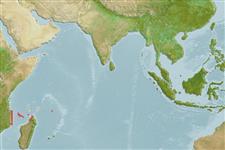>
Ovalentaria/misc (Various families in series Ovalentaria) >
Pseudochromidae (Dottybacks) > Congrogadinae
Etymology: Halimuraena: Greek, als, alis = salt + Latin, muraena = morey eel (Ref. 45335); lepopareia: Name from the Greek word 'lepos'(= a scale) and 'pareia' (= a cheek), referring to the diagnostic scaled cheek; noun in apposition..
More on author: Winterbottom.
Environment: milieu / climate zone / depth range / distribution range
Ekologi
laut berasosiasi dengan karang; kisaran kedalaman 0 - 2 m. Tropical; 10°S - 16°S
Western Indian Ocean: Pamanzi Island, Comoros to Nossi Bé, northern Madagascar.
Size / Weight / umur
Maturity: Lm ? range ? - ? cm
Max length : 7.4 cm SL jantan/; (Ref. 675)
deskripsi pendek
Morfologi | Morfometrik
Duri punggung (Keseluruhan (total)): 1; duri punggung lunak (Keseluruhan (total)): 47-50; Duri dubur 0; Sirip dubur lunak: 37 - 40. Gill membranes fused ventrally but free from isthmus. Shoulder with a dark ocellated spot. Preopercular canal with 6 pores; 8 suborbital pores; possess a bilateral, anterior interorbital pore. Cheeks, opercles and nape scaled. Second intermittent lateral line along midlateral septum, with 18-56 pored scales.
Inhabits shallow water among weed, rock, and coral.
Life cycle and mating behavior
Kematangan | Reproduksi, perkembang biakan | Pemijahan | telur-telur | Fecundity | Larva
Winterbottom, R., 1985. Revision and vicariance biogeography of the subfamily Congrogadidae (Pisces: Perciformes: Pseudochromidae). Indo-Pac. Fish. (9):34 p. (Ref. 531)
Status IUCN Red List (Ref. 130435)
ancaman kepada manusia
Harmless
penggunaan manusia
informasi lanjut
Nama-nama umumSinonim (persamaan)metabolismePemangsaEkotoksikologiReproduksi, perkembang biakanKematanganPemijahanSpawning aggregationFecunditytelur-telurpekembangan telor
Umur / SaizPertumbuhanpanjang-beratpanjang-panjangukuran frekuensiMorfometrikMorfologiLarvaDinamika larvapemulihanKelimpahanBRUVS
AcuanBudidaya airprofil budidaya airStrainGenetikaElectrophoresesDiturunkanPenyakit-penyakitPengolahanNutrientsMass conversion
mitraGambarStamps, Coins Misc.Suara-suaraCiguateraKecepatanTipe renangArea insangOtolithsOtakPenglihatan / visi
Alat, peralatan
laporan khas
muat turun XML
Sumber internet
Estimates based on models
Preferred temperature (Ref.
123201): 26.8 - 27.9, mean 27.5 °C (based on 60 cells).
Phylogenetic diversity index (Ref.
82804): PD
50 = 0.6250 [Uniqueness, from 0.5 = low to 2.0 = high].
Bayesian length-weight: a=0.00102 (0.00046 - 0.00225), b=3.06 (2.88 - 3.24), in cm total length, based on all LWR estimates for this body shape (Ref.
93245).
Trophic level (Ref.
69278): 3.8 ±0.6 se; based on size and trophs of closest relatives
Fishing Vulnerability (Ref.
59153): Low vulnerability (10 of 100).
